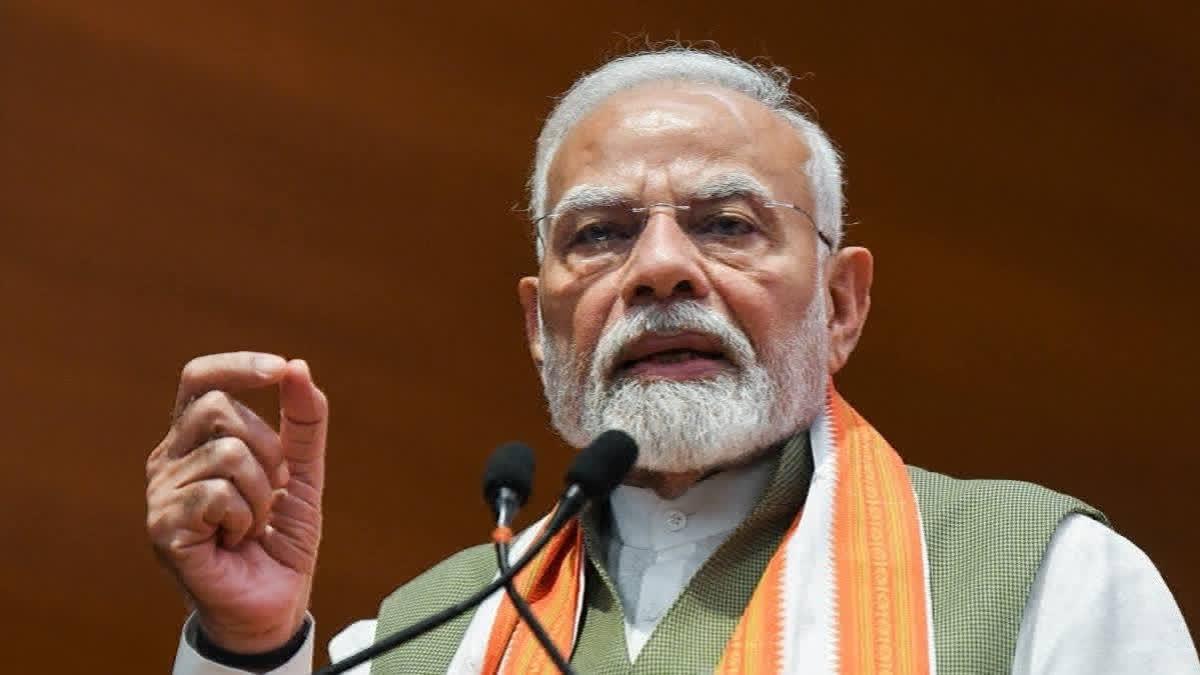New Delhi: The Union Cabinet chaired by Prime Minister Narendra Modi on Thursday approved the proposal of multiple schemes and infrastructure projects including PM Rashtriya Kishi Vikas Yojana to promote sustainable agriculture and Krishonnati Yojana to achieve food security for self-sufficiency.
Briefing the reporters here, Union Minister Ashwini Vaishnaw said, "The Department of Agriculture & Farmers Welfare (DA&FW) for rationalisation of all Centrally Sponsored Schemes (CSS) operating under Ministry of Agriculture and Farmer's into two-umbrella Schemes Pradhan Mantri Rashtriya Krishi Vikas Yojana (PM-RKVY), a cafeteria scheme and Krishonnati Yojana (KY)."
"PM-RKVY will promote sustainable agriculture, while KY will address food security and agricultural self-sufficiency. All components shall leverage technology to ensure efficient and effective implementation of the various components," he said.
An official statement said that the the PM-RKVY and KY will be implemented with a total proposed expenditure of Rs 1,01,321.61 crore.
"These schemes are implemented through the state governments. This exercise ensures that all the existing schemes are being continued. Wherever it was considered necessary to give filip to any area for farmer's welfare, the scheme has been taken up in mission mode, for example - the National Mission for Edible Oil-Oil Palm (NMEO-OP), Clean Plant Program, Digital Agriculture & National Mission for Edible Oil-Oil Seeds (NMEO-OS)," it said.
The scheme Mission Organic Value Chain Development for North Eastern Region (MOVCDNER), a component under the KY, is being modified by adding an additional component namely MOVCDNER - Detailed Project Report (MOVCDNER-DPR), which will provide flexibility to the North Eastern states to address critical challenges, it added.
The minister further pointed out that by rationalisation of the schemes, the states are given an opportunity to prepare a comprehensive strategic document on the agriculture sector of the state in a holistic manner.
"The strategic document focuses not only on the production and productivity of the crops but also tackles the emerging issues of climate resilient agriculture and development of value chain approach for agricultural commodities. These plans are envisaged to articulate the overall strategy and the schemes/programs, linked with the objectives flowing from the strategic framework," he added.
Vaishnaw further said the National Mission on Edible Oils – Oilseeds (NMEO-Oilseeds), an initiative aimed at boosting domestic oilseed production and achieving self-reliance in edible oils.
"The Mission will be implemented over a seven-year period, from 2024-25 to 2030-31, with a financial outlay of Rs 10,103 crore," he added.
The newly approved NMEO-Oilseeds will focus on enhancing the production of key primary oilseed crops such as Rapeseed-Mustard, Groundnut, Soybean, Sunflower, and Sesamum, as well as increasing collection and extraction efficiency from secondary sources like Cottonseed, Rice Bran, and Tree Borne Oils.
"The mission aims to increase primary oilseed production from 39 million tonnes (2022-23) to 69.7 million tonnes by 2030-31. Together with NMEO-OP (Oil Palm), the mission targets to increase domestic edible oil production to 25.45 million tonnes by 2030-31 meeting around 72 per cent of our projected domestic requirement.
"This will be achieved by promoting adoption of high-yielding high oil content seed varieties, extending cultivation into rice fallow areas, and promoting intercropping. The mission will harness ongoing development of high-quality seeds by using cutting-edge global technologies such as genome editing," he added.
To ensure the timely availability of quality seeds, the mission will introduce an online five-year rolling seed plan through the ‘Seed Authentication, Traceability & Holistic Inventory (SATHI)’ Portal, enabling states to establish advance tie-ups with seed-producing agencies, including cooperatives, Farmer Producer Organizations (FPOs), and government or private seed corporations.
65 new seed hubs and 50 seed storage units will be set up in the public sector to improve the seed production infrastructure.
Additionally, over 600 Value Chain Clusters will be developed across 347 unique districts, covering over 10 lakh hectares annually. These clusters will be managed by value chain partners such as FPOs, cooperatives, and public or private entities. Farmers in these clusters will have access to high-quality seeds, training on Good Agricultural Practices (GAP), and advisory services on weather and pest management.
The mission also seeks to expand oilseed cultivation by an additional 40 lakh hectares by targeting rice and potato fallow lands, promoting intercropping, and promoting crop diversification. Support will be extended to FPOs, cooperatives, and industry players to establish or upgrade post-harvest units, enhancing recovery from sources such as cottonseed, rice bran, corn oil, and Tree-Borne Oils (TBOs).
Furthermore, the mission will promote awareness of recommended dietary guidelines for edible oils through an Information, Education, and Communication (IEC) campaign.
Besides this, the Cabinet approved the modification of the existing Productivity Linked Reward (PLR) Scheme for the major ports and dock labour Board employees/workers from 2020-21 to 2025-26.
The modified PLR scheme applicable from 2020-21 to 2025-26 will benefit about 20,704 employees of Major Port Authorities and Dock Labour Board Employees and workers. The total financial implication for the entire period will be about Rs 200 crore.
Ministry of Ports, Shipping and Waterways has accordingly modified the PLR Scheme for all Major Port Authorities and Dock Labour Board employees/workers for the years 2020-21 to 2025-26 increasing weightage for calculation of PLR to port-specific performance instead of weightage to all India performance.
PLR has been calculated on the wage ceiling for the calculation of bonus at Rs 7000 per month. PLR shall be paid annually by enhancing the port-specific performance weightage from 50 per cent to 55 per cent and further increasing to 60 per cent. The All India Port performance weightage will also come down to 40 per cent over a period till 2025-26, this is replacing the existing equal weightage of 50 per cent for the All India Port performance and the specific Port performance. It is expected that the proposed modification will bring about the efficiency factor along with competition among the Major Ports, he said.



